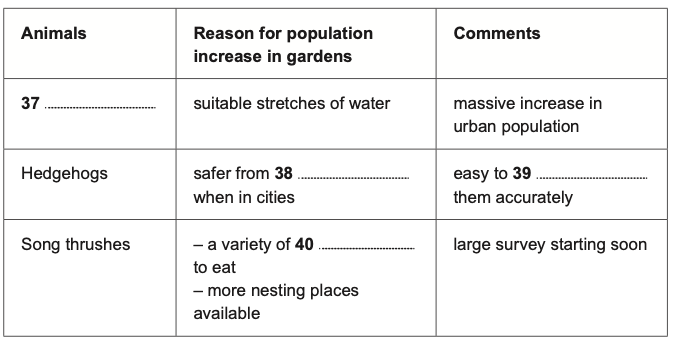Choose the correct letter, A, B or C.
A
They were concerned about the decline of one species.
B
They were interested in the effects of city growth.
C
They wanted to investigate a recent phenomenon.
A
consulting some official documents.
B
taking large-scale photos.
C
discussions with town surveyors.
A
take part in formal interviews.
B
keep a record of animals they saw.
C
get in contact when they saw a rare species.
A
which had a large number of animal species.
B
which they considered to be representative.
C
which had stable populations of rare animals.
A
wildlife problems in rural areas.
B
urban animal populations.
C
current gardening practices.
A
a lot of data has been obtained about them.
B
the group were most interested in them.
C
they best indicated general trends.
Complete the table below.
Write ONE WORD ONLY for each answer.

38
39
40
SECTION 4
Good morning.
早上好。
Today I'd like to present the findings of our Year 2 project on wildlife found in gardens throughout our city.
今天,我想就我们大二关于城市花园中发现的野生动物的项目发表调查结果。
I'll start by saying something about the background to the project, then talk a little bit about our research techniques, and then indicate some of our interim findings.
我会先说些关于这个项目的背景,然后再谈一点我们的研究方法,然后说明一些我们的中期发现。
First of all, how did we choose our topic?
首先,我们如何选择我们的话题?
Well, there are four of us in the group and one day while we were discussing a possible focus, two of the group mentioned that they had seen yet more sparrow-hawks - one of Britain's most interesting birds of prey - in their own city centre gardens and wondered why they were turning up in these gardens in great numbers.
好,我们组有四个人,一天当我们在讨论一个可能的重点的时候,两个组员提到他们看到更多的雀鹰, 英国最有趣的食肉鸟类之一,在他们的城市中心花园,想知道为什么它们这么大规模出现在这些花园里。
We were all very engaged by the idea of why wild animals would choose to inhabit a city garden.
我们都被为什么野生动物会选择城市花园栖居这个想法所吸引。
Why is it so popular with wildlife when the countryside itself is becoming less so?
为什么越来越受野生动物欢迎,而乡村的吸引力反而变小了呢?
The first thing we did was to establish what proportion of the urban land is taken up by private gardens.
我们所做的第一件事就是确定城市土地中多大比例是由私人花园占有的。
We estimated that it was about one fifth, and this was endorsed by looking at large-scale usage maps in the town land survey office - 24% to be precise.
我们估计是五分之一左右,通过观察城镇土地调查办公室的大规模使用地图得以证实,准确说是24%。
Our own informal discussions with neighbours and friends led us to believe that many garden owners had interesting experiences to relate regarding wild animal sightings so we decided to survey garden owners from different areas of the city.
我们自己与邻居和朋友的非正式讨论使我们相信许多花园的业主都有涉及野生动物踪迹的有趣经验,所以我们决定从城市的不同地区调查花园业主。
Just over 100 of them completed a survey once every two weeks for twelve months - ticking off species they had seen from a pro forma list - and adding the names of any rarer ones.
只有100多人完成了持续12个月、每两周完成一次的调查,勾出他们在预估表上看到的种类,并且加上稀有物种的名字。
Meanwhile, we were doing our own observations in selected gardens throughout the city.
同时,我们在整个城市中选择的花园里做我们自己的观察。
We deliberately chose smaller ones because they were by far the most typical in the city.
我们故意选择较小的,因为他们是迄今为止在城市里最典型的。
The whole point of the project was to look at the norm not the exception.
该项目的全部要点是看规范,而不是例外。
Alongside this primary research on urban gardens, we were studying a lot of books about the decline of wild animals in the countryside and thinking of possible causes for this.
除了城市花园的一手研究之外,我们也研究了关于野生动物在农村减少的书籍,考虑可能的原因。
So what did we find?
那么我们发现了些什么?
Well, so much that I just won't have time to tell you about here.
嗯,太多了以致于我没时间在这里告诉大家。
If you're interested in reading our more comprehensive findings, we've produced detailed graphic representations on the college web-site and of course any of the group would be happy to talk to you about them. Just email us.
如果您有兴趣阅读我们更全面的调查结果,我们已经在大学网站上制作了详细的图示,当然任何小组会很高兴地跟你探讨。欢迎给我们发邮件。
What we've decided to present today is information about just three species - because we felt these gave a good indication of the processes at work in rural and urban settings as a whole.
今天我们打算介绍三种物种的信息,因为我们觉得这是在农村和城市的环境作为整体的工作过程中一个很好的指示。
The first species to generate a lot of interesting information was frogs.
第一种产生很多有趣的信息是青蛙。
And there was a clear pattern here - they proliferate where there is suitable water.
这有一个清晰的模式,哪里有恰当的水源,它们就在那里增殖。
Garden ponds are on the increase, rural ponds are disappearing, leading to massive migration to the towns.
花园池塘在增加,而农村的池塘正在消失,导致大规模的迁移到城镇。
Hedgehogs are also finding it easier to live in urban areas - this time because their predators are not finding it quite so attractive to leave their rural environment, so hedgehogs have a better survival rate in cities.
刺猬也被发现容易生活在城市地区,因为他们的天敌不愿意离开乡村的环境,所以刺猬在城市有更好的存活率。
We had lots of sightings, so all in all we had no difficulties with our efforts to count their numbers precisely.
我们有过很多次观察,所以我们在精确的计数上没有问题。
Our final species is the finest of bird singers, the song thrush.
我们最后一个物种是最好的鸟类歌手,画眉鸟。
On the decline in the countryside, they are experiencing a resurgence in urban gardens because these days gardeners are buying lots of different plants which means there's an extensive range of seeds around, which is what they feed on.
在农村地区数量下降,它们在城市花园中开始复兴,因为现在园丁们买很多不同的植物,这意味着有周围有大量的各类种子,这正是它们所吃的。
Another factor is the provision of nesting places - which is actually better in gardens than the countryside.
另一个因素是提供筑巢的地方,实际上在花园中比农村好。
Hard to believe it, but it's true.
很难相信,但这是真的。
Incidentally, we discovered that a massive new survey on song thrushes is about to be launched, so you should keep an eye open for that.
顺便说一句,我们有大量关于画眉的新发现现将会推出,所以你要密切关注。
Now, I'd be happy to answer any questions you may have ...
现在,我很乐意回答你的任何问题……
上一题
剑9 Test 4 Section 3下一题
剑9 Test 1 Section 1